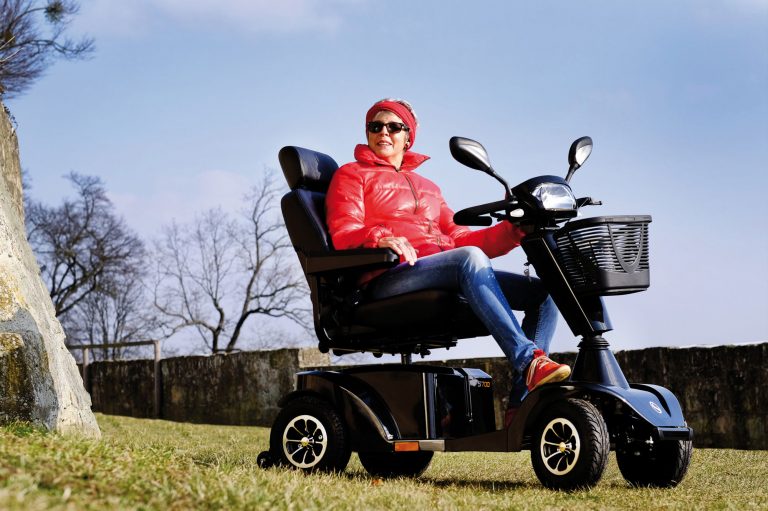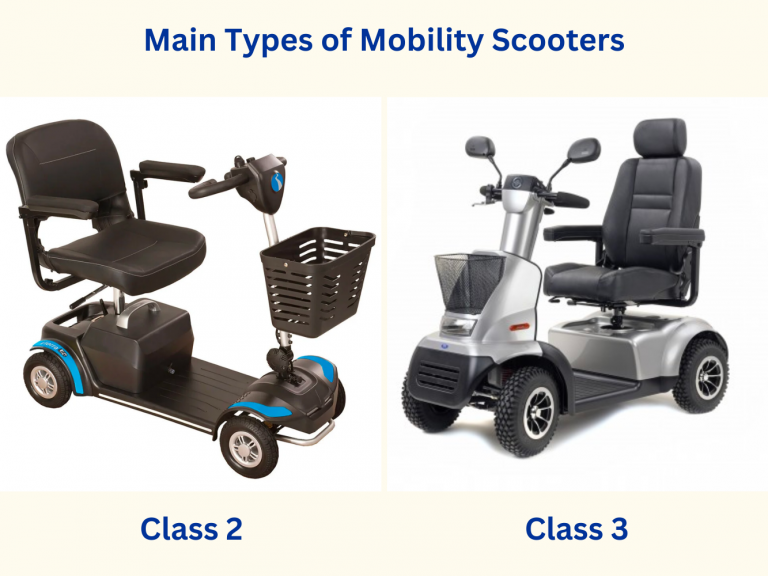Rules for Roads: Where Can You Use Your Mobility Scooter?
For many elderly people and those with mobility issues, mobility scooters provide independence, freedom and a convenient way to get around.
With this in mind, any unexpected restrictions or barriers to using them may cause distress and disruption.
Different environments are likely to have different rules and guidelines when it comes to using mobility scooters, and it’s important to understand where they can be used and when you may need to make alternative arrangements.
In this article, Ideas in Action will explain UK mobility scooter rules ensuring you have a full understanding of where yours is allowed.

The different types of mobility scooters
Before we take a closer look at where mobility scooters are allowed, let’s first examine the different types. This is usually a key factor in determining whether a mobility scooter is allowed in a space or not.
There are two main types of mobility scooters which are as follows:
- Class 2 scooters – These scooters are designed for pavements and indoor use. They have a speed limit of 4mph and should be no more than 600mm wide, 1000mm long and shouldn’t exceed a turning radius of 1200mm.
- Class 3 scooters – Featuring manual brakes, front and rear lights, and hazard warning lights, Class 3 scooters are designed for the roads and can reach speeds of 6-8mph. They also need to be officially registered with the Driver and Vehicle Licensing Agency (DVLA).

Are mobility scooters allowed on the road?
Yes, mobility scooters can be legally used on the roads as long as they meet the following conditions:
- They’re a registered Class 3 scooter
- Have a maximum speed of 8mph
- Have a functioning horn
- Have a maximum weight of 150kg (or 200kg with additional equipment)
- Are no wider than 850mm
- Have a rearview mirror
- The brakes are fully functional
Are mobility scooters allowed on the pavement?
As long as they do not exceed a speed of 4mph, mobility scooters are allowed on pavements. This speed limit means that Class 2 scooters are more suitable, and care and attention should be taken at all times by the individual operating the scooter to ensure pedestrians are not at risk.
Are mobility scooters allowed in hospitals?
Many people who use mobility scooters find it difficult to get around, and so may need to visit the hospital more often. So, yes, mobility scooters are allowed in hospitals.
In fact, hospitals are required to make reasonable adjustments to allow all members of the public to access them. This includes permitting mobility scooters.
However, some areas of the hospital, such as in lifts, may only accommodate smaller Class 2 scooters.
Are mobility scooters allowed in shops?
Yes, all mobility scooters are allowed in shops. The Equality Act 2010 outlines that all commercial businesses must make reasonable adjustments to provide access to their goods to all members of the public. This includes removing barriers and ensuring mobility scooters can gain access.
Are mobility scooters allowed on buses?
Yes, Class 2 scooters are allowed on buses. However, you must have a permit to be able to do so.
You will need to independently apply for this permit which may come with training explaining how to use your scooter on the bus. It’s important to note that not all bus operators have to allow mobility scooters on their bus, but many operators have signed up to the CPT code which outlines obligations to make their buses accessible.
Read more about this in our previous article on the subject.
Are mobility scooters allowed on trains?
In general, yes, mobility scooters are allowed on trains as long as they do not exceed certain dimensions. They must not be more than 700mm wide or 1200mm long.
While they are generally allowed, there are actually no laws mandating that train companies must allow them on. With this in mind, policies may vary between different operators so always check before you travel.
At Ideas in Action, we have spent more than 25 years working across Birmingham with a whole host of quality mobility scooters and a range of other products that help elderly and disabled people regain their independence.
For more information on what we do, why not visit our heated showroom or give us a call to find out more?
